Analyzing Apple's Integrated Digital Business Model
VerifiedAdded on 2020/04/21
|12
|2715
|302
AI Summary
The document provides an in-depth look at Apple Inc.'s approach to embedding its digital strategy within various aspects of its business operations. It highlights how this integration is pivotal for enhancing customer experiences, driving innovation, and maintaining a competitive advantage in the technology industry. The discussion includes analysis from multiple sources that cover strategic changes, marketing approaches, and consumer engagement strategies employed by Apple. By focusing on these elements, the assignment aims to elucidate the comprehensive methods through which Apple ensures its position as an innovative leader while meeting evolving market demands.
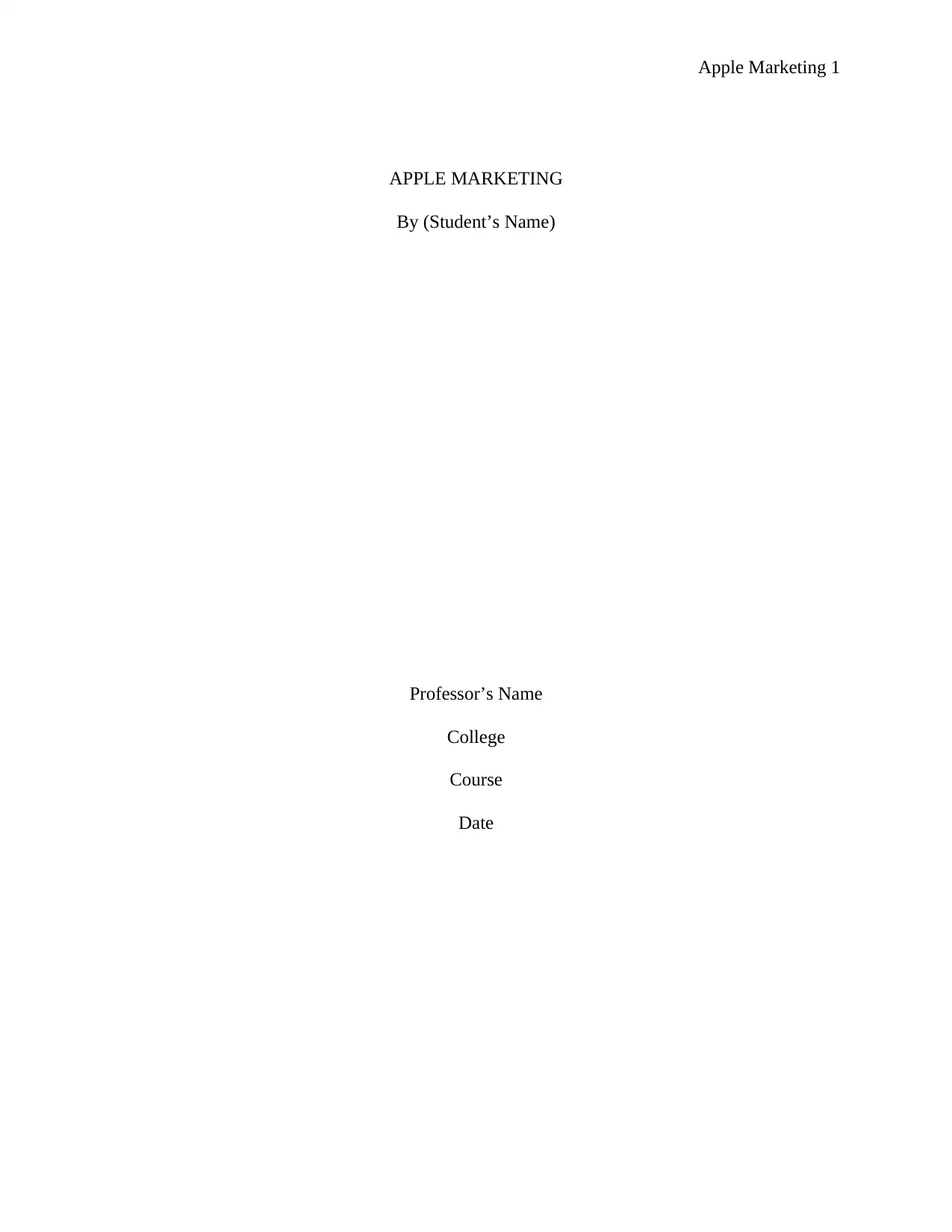
Apple Marketing 1
APPLE MARKETING
By (Student’s Name)
Professor’s Name
College
Course
Date
APPLE MARKETING
By (Student’s Name)
Professor’s Name
College
Course
Date
Paraphrase This Document
Need a fresh take? Get an instant paraphrase of this document with our AI Paraphraser
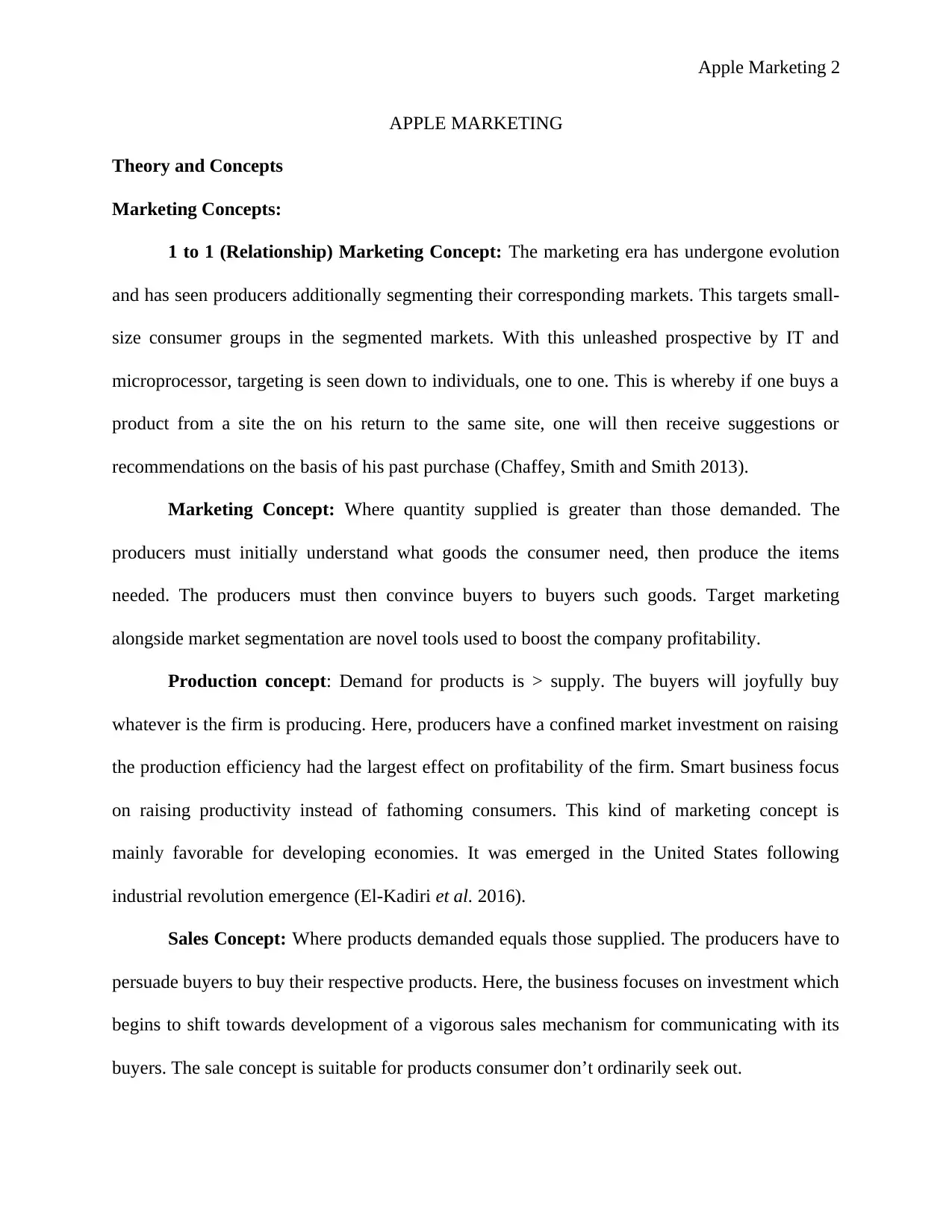
Apple Marketing 2
APPLE MARKETING
Theory and Concepts
Marketing Concepts:
1 to 1 (Relationship) Marketing Concept: The marketing era has undergone evolution
and has seen producers additionally segmenting their corresponding markets. This targets small-
size consumer groups in the segmented markets. With this unleashed prospective by IT and
microprocessor, targeting is seen down to individuals, one to one. This is whereby if one buys a
product from a site the on his return to the same site, one will then receive suggestions or
recommendations on the basis of his past purchase (Chaffey, Smith and Smith 2013).
Marketing Concept: Where quantity supplied is greater than those demanded. The
producers must initially understand what goods the consumer need, then produce the items
needed. The producers must then convince buyers to buyers such goods. Target marketing
alongside market segmentation are novel tools used to boost the company profitability.
Production concept: Demand for products is > supply. The buyers will joyfully buy
whatever is the firm is producing. Here, producers have a confined market investment on raising
the production efficiency had the largest effect on profitability of the firm. Smart business focus
on raising productivity instead of fathoming consumers. This kind of marketing concept is
mainly favorable for developing economies. It was emerged in the United States following
industrial revolution emergence (El-Kadiri et al. 2016).
Sales Concept: Where products demanded equals those supplied. The producers have to
persuade buyers to buy their respective products. Here, the business focuses on investment which
begins to shift towards development of a vigorous sales mechanism for communicating with its
buyers. The sale concept is suitable for products consumer don’t ordinarily seek out.
APPLE MARKETING
Theory and Concepts
Marketing Concepts:
1 to 1 (Relationship) Marketing Concept: The marketing era has undergone evolution
and has seen producers additionally segmenting their corresponding markets. This targets small-
size consumer groups in the segmented markets. With this unleashed prospective by IT and
microprocessor, targeting is seen down to individuals, one to one. This is whereby if one buys a
product from a site the on his return to the same site, one will then receive suggestions or
recommendations on the basis of his past purchase (Chaffey, Smith and Smith 2013).
Marketing Concept: Where quantity supplied is greater than those demanded. The
producers must initially understand what goods the consumer need, then produce the items
needed. The producers must then convince buyers to buyers such goods. Target marketing
alongside market segmentation are novel tools used to boost the company profitability.
Production concept: Demand for products is > supply. The buyers will joyfully buy
whatever is the firm is producing. Here, producers have a confined market investment on raising
the production efficiency had the largest effect on profitability of the firm. Smart business focus
on raising productivity instead of fathoming consumers. This kind of marketing concept is
mainly favorable for developing economies. It was emerged in the United States following
industrial revolution emergence (El-Kadiri et al. 2016).
Sales Concept: Where products demanded equals those supplied. The producers have to
persuade buyers to buy their respective products. Here, the business focuses on investment which
begins to shift towards development of a vigorous sales mechanism for communicating with its
buyers. The sale concept is suitable for products consumer don’t ordinarily seek out.
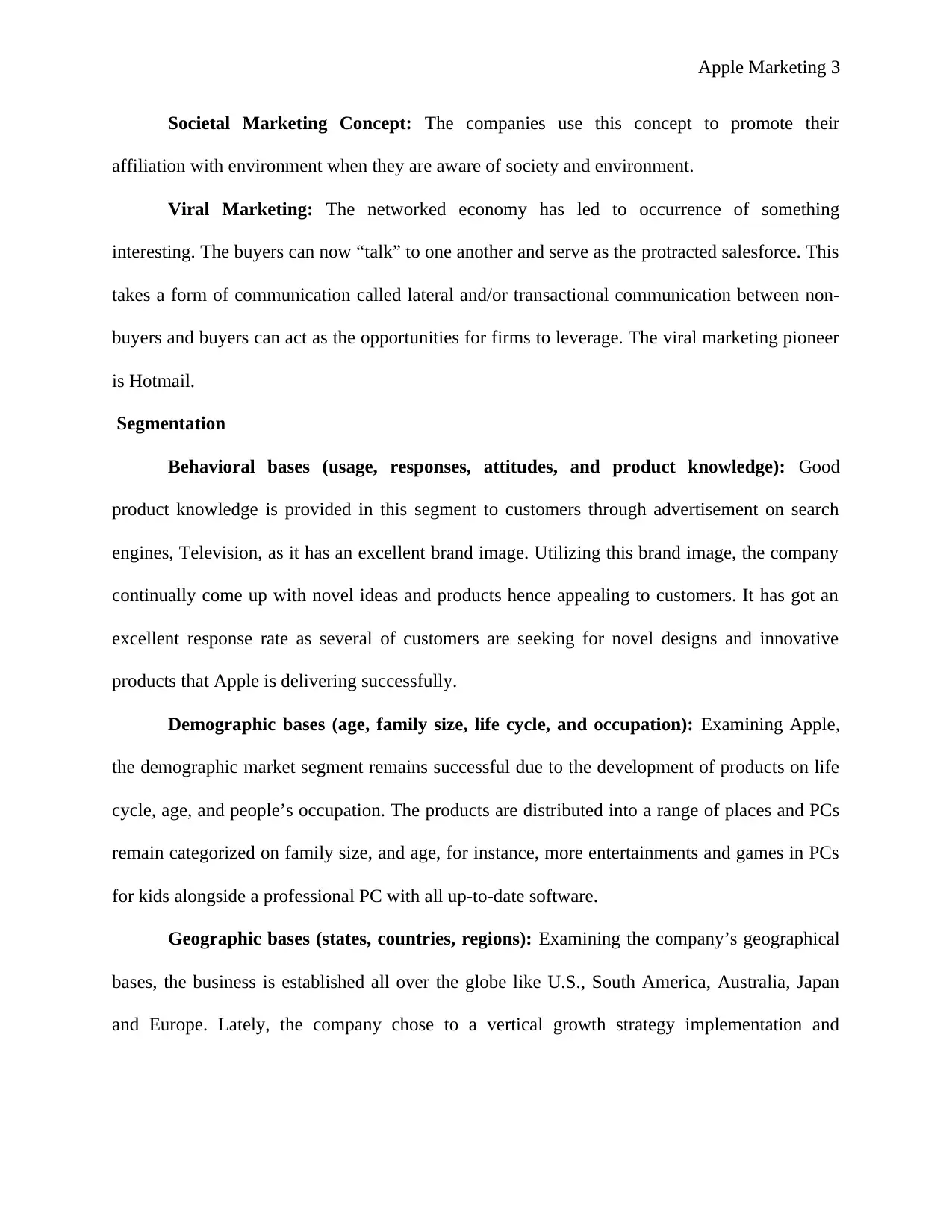
Apple Marketing 3
Societal Marketing Concept: The companies use this concept to promote their
affiliation with environment when they are aware of society and environment.
Viral Marketing: The networked economy has led to occurrence of something
interesting. The buyers can now “talk” to one another and serve as the protracted salesforce. This
takes a form of communication called lateral and/or transactional communication between non-
buyers and buyers can act as the opportunities for firms to leverage. The viral marketing pioneer
is Hotmail.
Segmentation
Behavioral bases (usage, responses, attitudes, and product knowledge): Good
product knowledge is provided in this segment to customers through advertisement on search
engines, Television, as it has an excellent brand image. Utilizing this brand image, the company
continually come up with novel ideas and products hence appealing to customers. It has got an
excellent response rate as several of customers are seeking for novel designs and innovative
products that Apple is delivering successfully.
Demographic bases (age, family size, life cycle, and occupation): Examining Apple,
the demographic market segment remains successful due to the development of products on life
cycle, age, and people’s occupation. The products are distributed into a range of places and PCs
remain categorized on family size, and age, for instance, more entertainments and games in PCs
for kids alongside a professional PC with all up-to-date software.
Geographic bases (states, countries, regions): Examining the company’s geographical
bases, the business is established all over the globe like U.S., South America, Australia, Japan
and Europe. Lately, the company chose to a vertical growth strategy implementation and
Societal Marketing Concept: The companies use this concept to promote their
affiliation with environment when they are aware of society and environment.
Viral Marketing: The networked economy has led to occurrence of something
interesting. The buyers can now “talk” to one another and serve as the protracted salesforce. This
takes a form of communication called lateral and/or transactional communication between non-
buyers and buyers can act as the opportunities for firms to leverage. The viral marketing pioneer
is Hotmail.
Segmentation
Behavioral bases (usage, responses, attitudes, and product knowledge): Good
product knowledge is provided in this segment to customers through advertisement on search
engines, Television, as it has an excellent brand image. Utilizing this brand image, the company
continually come up with novel ideas and products hence appealing to customers. It has got an
excellent response rate as several of customers are seeking for novel designs and innovative
products that Apple is delivering successfully.
Demographic bases (age, family size, life cycle, and occupation): Examining Apple,
the demographic market segment remains successful due to the development of products on life
cycle, age, and people’s occupation. The products are distributed into a range of places and PCs
remain categorized on family size, and age, for instance, more entertainments and games in PCs
for kids alongside a professional PC with all up-to-date software.
Geographic bases (states, countries, regions): Examining the company’s geographical
bases, the business is established all over the globe like U.S., South America, Australia, Japan
and Europe. Lately, the company chose to a vertical growth strategy implementation and
⊘ This is a preview!⊘
Do you want full access?
Subscribe today to unlock all pages.

Trusted by 1+ million students worldwide
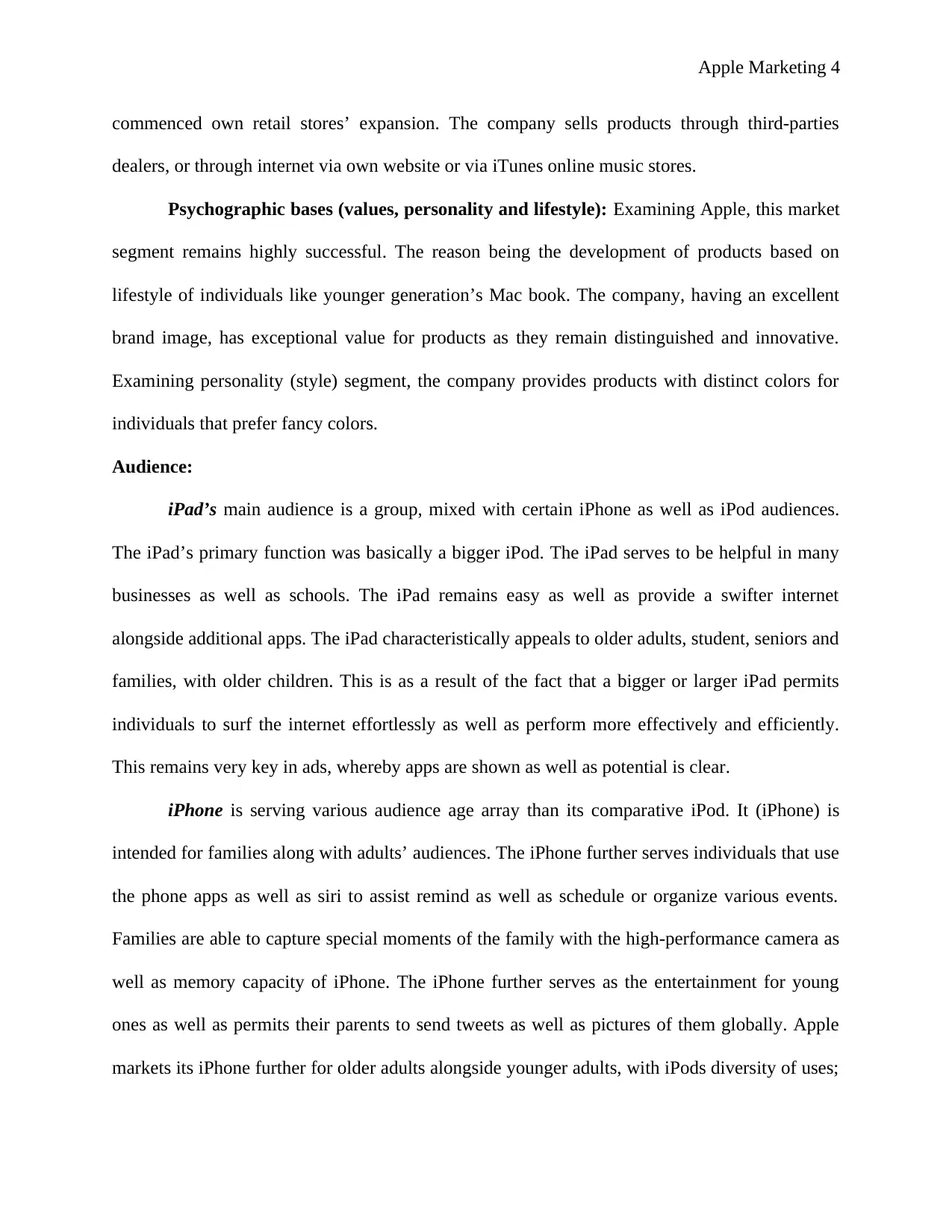
Apple Marketing 4
commenced own retail stores’ expansion. The company sells products through third-parties
dealers, or through internet via own website or via iTunes online music stores.
Psychographic bases (values, personality and lifestyle): Examining Apple, this market
segment remains highly successful. The reason being the development of products based on
lifestyle of individuals like younger generation’s Mac book. The company, having an excellent
brand image, has exceptional value for products as they remain distinguished and innovative.
Examining personality (style) segment, the company provides products with distinct colors for
individuals that prefer fancy colors.
Audience:
iPad’s main audience is a group, mixed with certain iPhone as well as iPod audiences.
The iPad’s primary function was basically a bigger iPod. The iPad serves to be helpful in many
businesses as well as schools. The iPad remains easy as well as provide a swifter internet
alongside additional apps. The iPad characteristically appeals to older adults, student, seniors and
families, with older children. This is as a result of the fact that a bigger or larger iPad permits
individuals to surf the internet effortlessly as well as perform more effectively and efficiently.
This remains very key in ads, whereby apps are shown as well as potential is clear.
iPhone is serving various audience age array than its comparative iPod. It (iPhone) is
intended for families along with adults’ audiences. The iPhone further serves individuals that use
the phone apps as well as siri to assist remind as well as schedule or organize various events.
Families are able to capture special moments of the family with the high-performance camera as
well as memory capacity of iPhone. The iPhone further serves as the entertainment for young
ones as well as permits their parents to send tweets as well as pictures of them globally. Apple
markets its iPhone further for older adults alongside younger adults, with iPods diversity of uses;
commenced own retail stores’ expansion. The company sells products through third-parties
dealers, or through internet via own website or via iTunes online music stores.
Psychographic bases (values, personality and lifestyle): Examining Apple, this market
segment remains highly successful. The reason being the development of products based on
lifestyle of individuals like younger generation’s Mac book. The company, having an excellent
brand image, has exceptional value for products as they remain distinguished and innovative.
Examining personality (style) segment, the company provides products with distinct colors for
individuals that prefer fancy colors.
Audience:
iPad’s main audience is a group, mixed with certain iPhone as well as iPod audiences.
The iPad’s primary function was basically a bigger iPod. The iPad serves to be helpful in many
businesses as well as schools. The iPad remains easy as well as provide a swifter internet
alongside additional apps. The iPad characteristically appeals to older adults, student, seniors and
families, with older children. This is as a result of the fact that a bigger or larger iPad permits
individuals to surf the internet effortlessly as well as perform more effectively and efficiently.
This remains very key in ads, whereby apps are shown as well as potential is clear.
iPhone is serving various audience age array than its comparative iPod. It (iPhone) is
intended for families along with adults’ audiences. The iPhone further serves individuals that use
the phone apps as well as siri to assist remind as well as schedule or organize various events.
Families are able to capture special moments of the family with the high-performance camera as
well as memory capacity of iPhone. The iPhone further serves as the entertainment for young
ones as well as permits their parents to send tweets as well as pictures of them globally. Apple
markets its iPhone further for older adults alongside younger adults, with iPods diversity of uses;
Paraphrase This Document
Need a fresh take? Get an instant paraphrase of this document with our AI Paraphraser
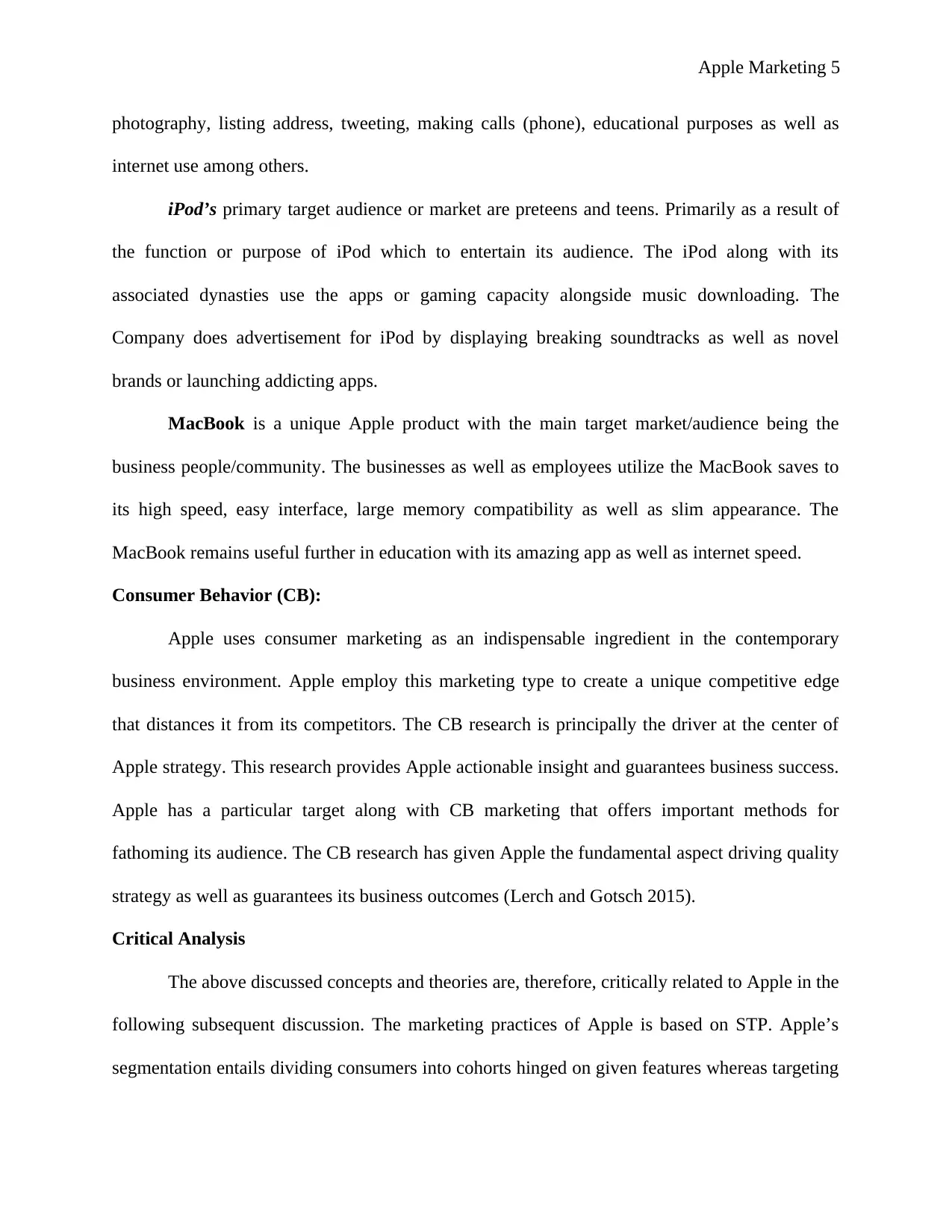
Apple Marketing 5
photography, listing address, tweeting, making calls (phone), educational purposes as well as
internet use among others.
iPod’s primary target audience or market are preteens and teens. Primarily as a result of
the function or purpose of iPod which to entertain its audience. The iPod along with its
associated dynasties use the apps or gaming capacity alongside music downloading. The
Company does advertisement for iPod by displaying breaking soundtracks as well as novel
brands or launching addicting apps.
MacBook is a unique Apple product with the main target market/audience being the
business people/community. The businesses as well as employees utilize the MacBook saves to
its high speed, easy interface, large memory compatibility as well as slim appearance. The
MacBook remains useful further in education with its amazing app as well as internet speed.
Consumer Behavior (CB):
Apple uses consumer marketing as an indispensable ingredient in the contemporary
business environment. Apple employ this marketing type to create a unique competitive edge
that distances it from its competitors. The CB research is principally the driver at the center of
Apple strategy. This research provides Apple actionable insight and guarantees business success.
Apple has a particular target along with CB marketing that offers important methods for
fathoming its audience. The CB research has given Apple the fundamental aspect driving quality
strategy as well as guarantees its business outcomes (Lerch and Gotsch 2015).
Critical Analysis
The above discussed concepts and theories are, therefore, critically related to Apple in the
following subsequent discussion. The marketing practices of Apple is based on STP. Apple’s
segmentation entails dividing consumers into cohorts hinged on given features whereas targeting
photography, listing address, tweeting, making calls (phone), educational purposes as well as
internet use among others.
iPod’s primary target audience or market are preteens and teens. Primarily as a result of
the function or purpose of iPod which to entertain its audience. The iPod along with its
associated dynasties use the apps or gaming capacity alongside music downloading. The
Company does advertisement for iPod by displaying breaking soundtracks as well as novel
brands or launching addicting apps.
MacBook is a unique Apple product with the main target market/audience being the
business people/community. The businesses as well as employees utilize the MacBook saves to
its high speed, easy interface, large memory compatibility as well as slim appearance. The
MacBook remains useful further in education with its amazing app as well as internet speed.
Consumer Behavior (CB):
Apple uses consumer marketing as an indispensable ingredient in the contemporary
business environment. Apple employ this marketing type to create a unique competitive edge
that distances it from its competitors. The CB research is principally the driver at the center of
Apple strategy. This research provides Apple actionable insight and guarantees business success.
Apple has a particular target along with CB marketing that offers important methods for
fathoming its audience. The CB research has given Apple the fundamental aspect driving quality
strategy as well as guarantees its business outcomes (Lerch and Gotsch 2015).
Critical Analysis
The above discussed concepts and theories are, therefore, critically related to Apple in the
following subsequent discussion. The marketing practices of Apple is based on STP. Apple’s
segmentation entails dividing consumers into cohorts hinged on given features whereas targeting
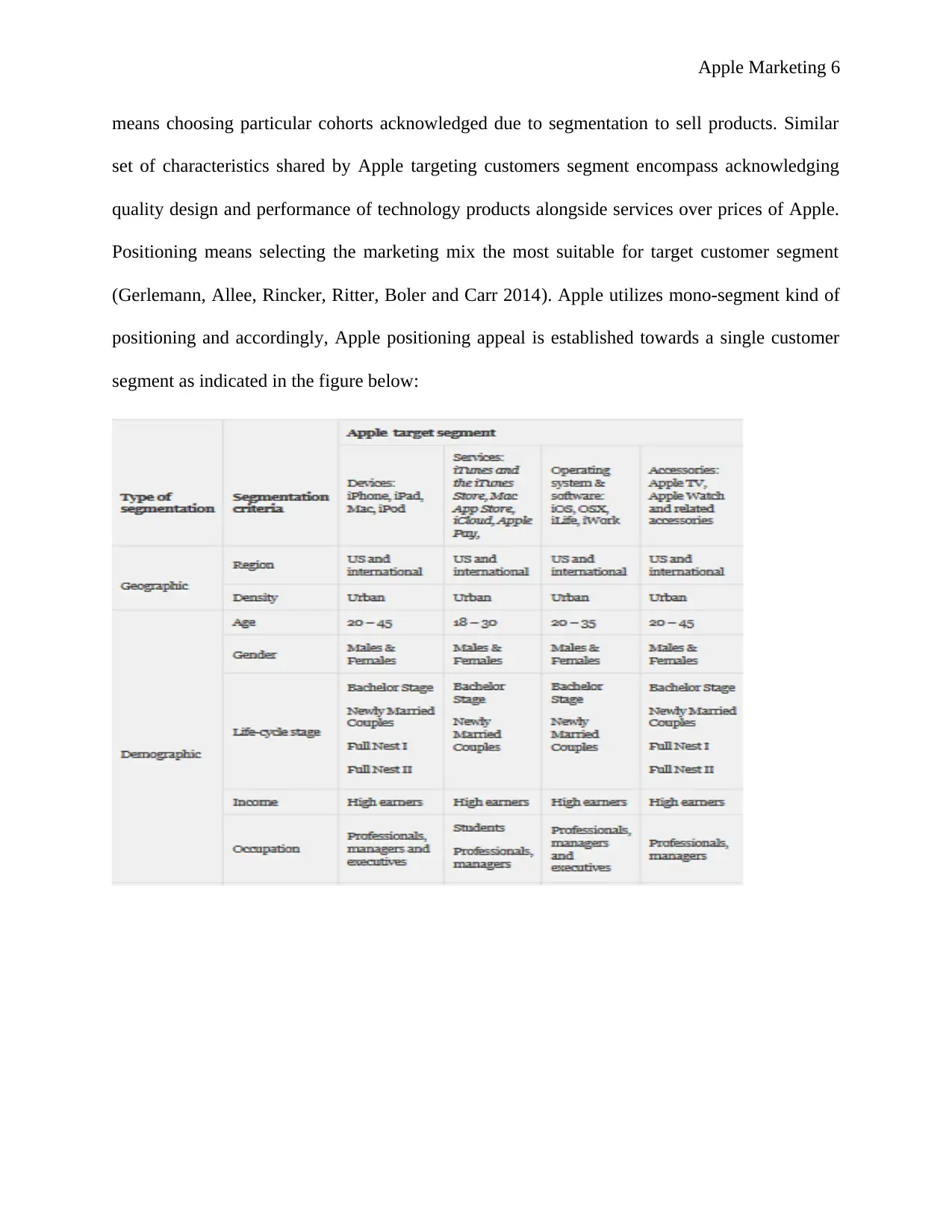
Apple Marketing 6
means choosing particular cohorts acknowledged due to segmentation to sell products. Similar
set of characteristics shared by Apple targeting customers segment encompass acknowledging
quality design and performance of technology products alongside services over prices of Apple.
Positioning means selecting the marketing mix the most suitable for target customer segment
(Gerlemann, Allee, Rincker, Ritter, Boler and Carr 2014). Apple utilizes mono-segment kind of
positioning and accordingly, Apple positioning appeal is established towards a single customer
segment as indicated in the figure below:
means choosing particular cohorts acknowledged due to segmentation to sell products. Similar
set of characteristics shared by Apple targeting customers segment encompass acknowledging
quality design and performance of technology products alongside services over prices of Apple.
Positioning means selecting the marketing mix the most suitable for target customer segment
(Gerlemann, Allee, Rincker, Ritter, Boler and Carr 2014). Apple utilizes mono-segment kind of
positioning and accordingly, Apple positioning appeal is established towards a single customer
segment as indicated in the figure below:
⊘ This is a preview!⊘
Do you want full access?
Subscribe today to unlock all pages.

Trusted by 1+ million students worldwide
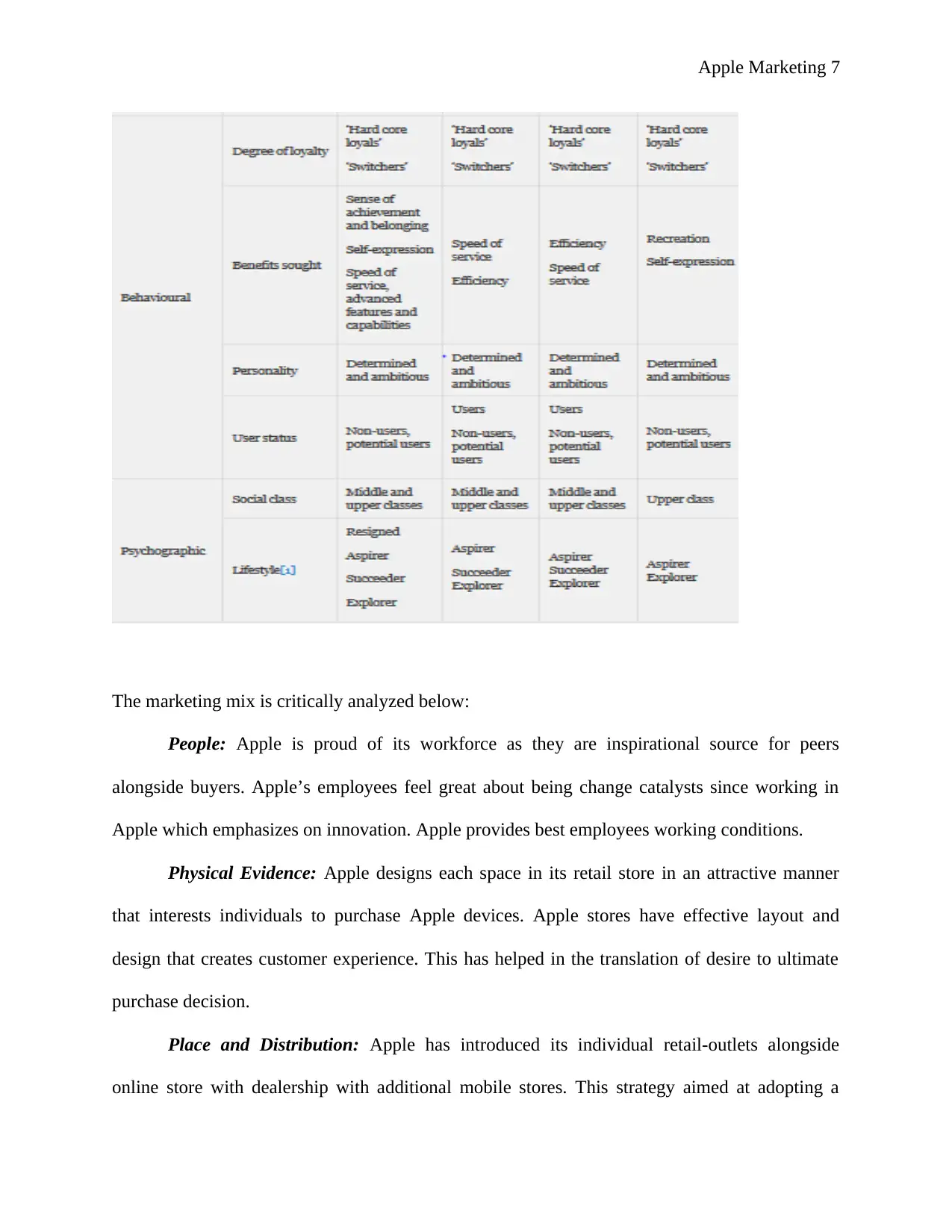
Apple Marketing 7
The marketing mix is critically analyzed below:
People: Apple is proud of its workforce as they are inspirational source for peers
alongside buyers. Apple’s employees feel great about being change catalysts since working in
Apple which emphasizes on innovation. Apple provides best employees working conditions.
Physical Evidence: Apple designs each space in its retail store in an attractive manner
that interests individuals to purchase Apple devices. Apple stores have effective layout and
design that creates customer experience. This has helped in the translation of desire to ultimate
purchase decision.
Place and Distribution: Apple has introduced its individual retail-outlets alongside
online store with dealership with additional mobile stores. This strategy aimed at adopting a
The marketing mix is critically analyzed below:
People: Apple is proud of its workforce as they are inspirational source for peers
alongside buyers. Apple’s employees feel great about being change catalysts since working in
Apple which emphasizes on innovation. Apple provides best employees working conditions.
Physical Evidence: Apple designs each space in its retail store in an attractive manner
that interests individuals to purchase Apple devices. Apple stores have effective layout and
design that creates customer experience. This has helped in the translation of desire to ultimate
purchase decision.
Place and Distribution: Apple has introduced its individual retail-outlets alongside
online store with dealership with additional mobile stores. This strategy aimed at adopting a
Paraphrase This Document
Need a fresh take? Get an instant paraphrase of this document with our AI Paraphraser
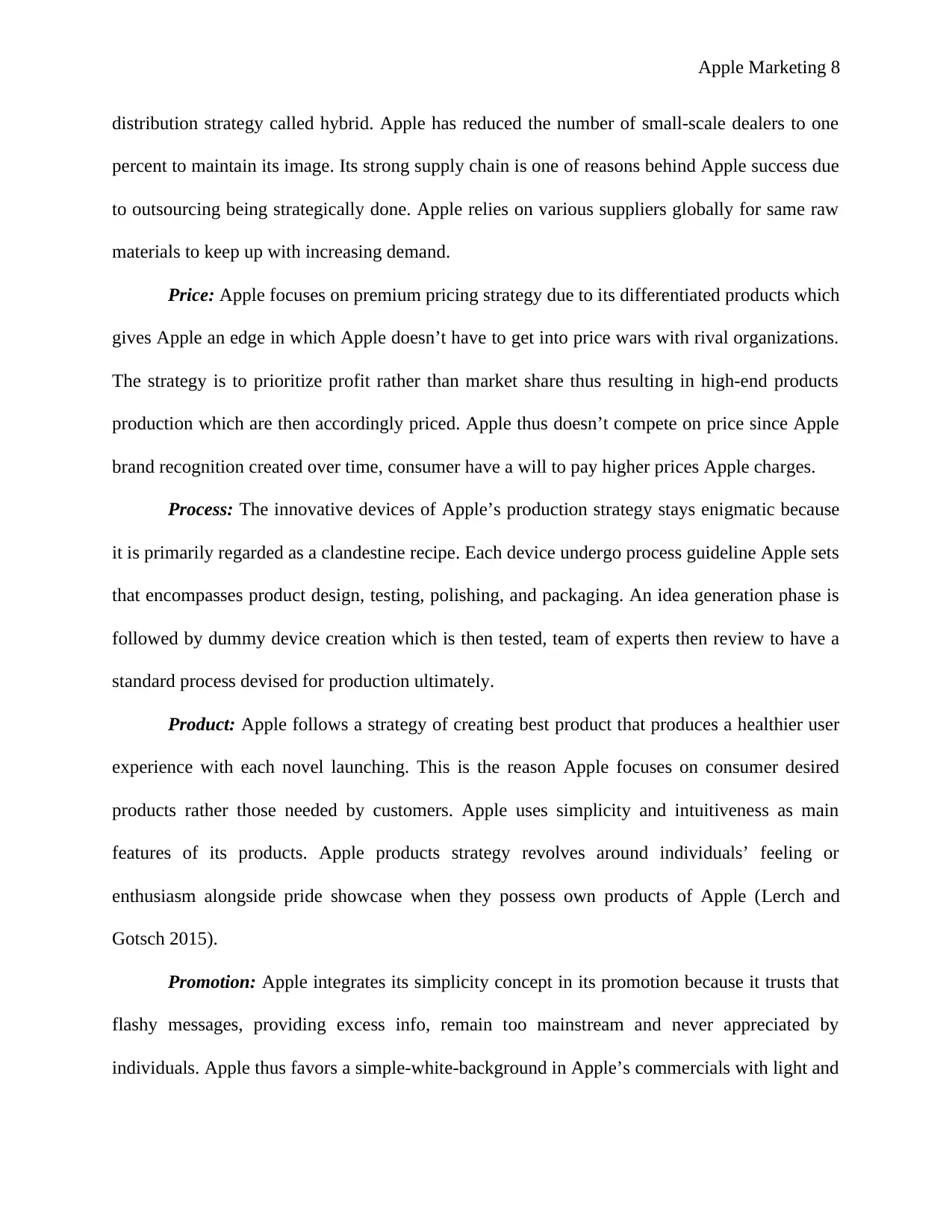
Apple Marketing 8
distribution strategy called hybrid. Apple has reduced the number of small-scale dealers to one
percent to maintain its image. Its strong supply chain is one of reasons behind Apple success due
to outsourcing being strategically done. Apple relies on various suppliers globally for same raw
materials to keep up with increasing demand.
Price: Apple focuses on premium pricing strategy due to its differentiated products which
gives Apple an edge in which Apple doesn’t have to get into price wars with rival organizations.
The strategy is to prioritize profit rather than market share thus resulting in high-end products
production which are then accordingly priced. Apple thus doesn’t compete on price since Apple
brand recognition created over time, consumer have a will to pay higher prices Apple charges.
Process: The innovative devices of Apple’s production strategy stays enigmatic because
it is primarily regarded as a clandestine recipe. Each device undergo process guideline Apple sets
that encompasses product design, testing, polishing, and packaging. An idea generation phase is
followed by dummy device creation which is then tested, team of experts then review to have a
standard process devised for production ultimately.
Product: Apple follows a strategy of creating best product that produces a healthier user
experience with each novel launching. This is the reason Apple focuses on consumer desired
products rather those needed by customers. Apple uses simplicity and intuitiveness as main
features of its products. Apple products strategy revolves around individuals’ feeling or
enthusiasm alongside pride showcase when they possess own products of Apple (Lerch and
Gotsch 2015).
Promotion: Apple integrates its simplicity concept in its promotion because it trusts that
flashy messages, providing excess info, remain too mainstream and never appreciated by
individuals. Apple thus favors a simple-white-background in Apple’s commercials with light and
distribution strategy called hybrid. Apple has reduced the number of small-scale dealers to one
percent to maintain its image. Its strong supply chain is one of reasons behind Apple success due
to outsourcing being strategically done. Apple relies on various suppliers globally for same raw
materials to keep up with increasing demand.
Price: Apple focuses on premium pricing strategy due to its differentiated products which
gives Apple an edge in which Apple doesn’t have to get into price wars with rival organizations.
The strategy is to prioritize profit rather than market share thus resulting in high-end products
production which are then accordingly priced. Apple thus doesn’t compete on price since Apple
brand recognition created over time, consumer have a will to pay higher prices Apple charges.
Process: The innovative devices of Apple’s production strategy stays enigmatic because
it is primarily regarded as a clandestine recipe. Each device undergo process guideline Apple sets
that encompasses product design, testing, polishing, and packaging. An idea generation phase is
followed by dummy device creation which is then tested, team of experts then review to have a
standard process devised for production ultimately.
Product: Apple follows a strategy of creating best product that produces a healthier user
experience with each novel launching. This is the reason Apple focuses on consumer desired
products rather those needed by customers. Apple uses simplicity and intuitiveness as main
features of its products. Apple products strategy revolves around individuals’ feeling or
enthusiasm alongside pride showcase when they possess own products of Apple (Lerch and
Gotsch 2015).
Promotion: Apple integrates its simplicity concept in its promotion because it trusts that
flashy messages, providing excess info, remain too mainstream and never appreciated by
individuals. Apple thus favors a simple-white-background in Apple’s commercials with light and
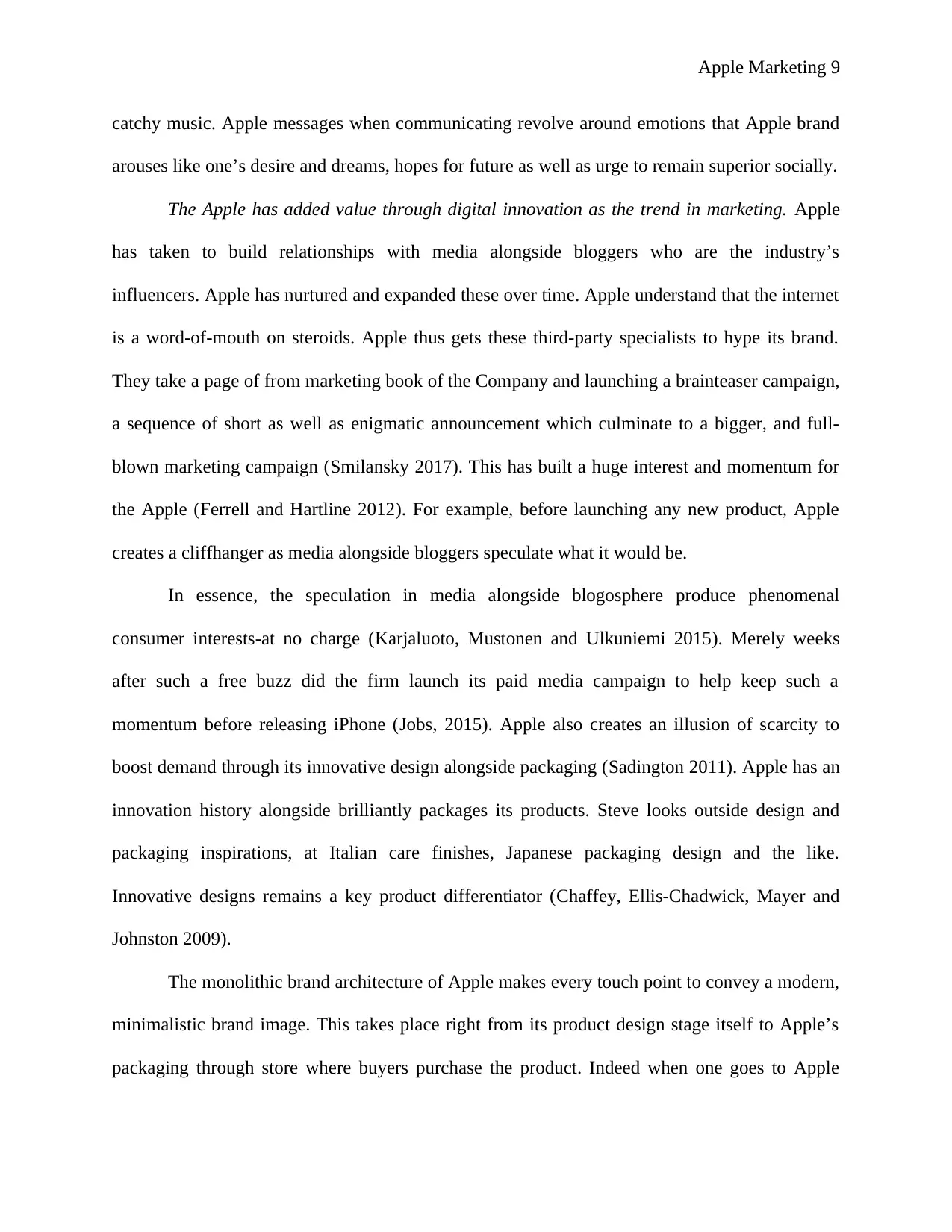
Apple Marketing 9
catchy music. Apple messages when communicating revolve around emotions that Apple brand
arouses like one’s desire and dreams, hopes for future as well as urge to remain superior socially.
The Apple has added value through digital innovation as the trend in marketing. Apple
has taken to build relationships with media alongside bloggers who are the industry’s
influencers. Apple has nurtured and expanded these over time. Apple understand that the internet
is a word-of-mouth on steroids. Apple thus gets these third-party specialists to hype its brand.
They take a page of from marketing book of the Company and launching a brainteaser campaign,
a sequence of short as well as enigmatic announcement which culminate to a bigger, and full-
blown marketing campaign (Smilansky 2017). This has built a huge interest and momentum for
the Apple (Ferrell and Hartline 2012). For example, before launching any new product, Apple
creates a cliffhanger as media alongside bloggers speculate what it would be.
In essence, the speculation in media alongside blogosphere produce phenomenal
consumer interests-at no charge (Karjaluoto, Mustonen and Ulkuniemi 2015). Merely weeks
after such a free buzz did the firm launch its paid media campaign to help keep such a
momentum before releasing iPhone (Jobs, 2015). Apple also creates an illusion of scarcity to
boost demand through its innovative design alongside packaging (Sadington 2011). Apple has an
innovation history alongside brilliantly packages its products. Steve looks outside design and
packaging inspirations, at Italian care finishes, Japanese packaging design and the like.
Innovative designs remains a key product differentiator (Chaffey, Ellis-Chadwick, Mayer and
Johnston 2009).
The monolithic brand architecture of Apple makes every touch point to convey a modern,
minimalistic brand image. This takes place right from its product design stage itself to Apple’s
packaging through store where buyers purchase the product. Indeed when one goes to Apple
catchy music. Apple messages when communicating revolve around emotions that Apple brand
arouses like one’s desire and dreams, hopes for future as well as urge to remain superior socially.
The Apple has added value through digital innovation as the trend in marketing. Apple
has taken to build relationships with media alongside bloggers who are the industry’s
influencers. Apple has nurtured and expanded these over time. Apple understand that the internet
is a word-of-mouth on steroids. Apple thus gets these third-party specialists to hype its brand.
They take a page of from marketing book of the Company and launching a brainteaser campaign,
a sequence of short as well as enigmatic announcement which culminate to a bigger, and full-
blown marketing campaign (Smilansky 2017). This has built a huge interest and momentum for
the Apple (Ferrell and Hartline 2012). For example, before launching any new product, Apple
creates a cliffhanger as media alongside bloggers speculate what it would be.
In essence, the speculation in media alongside blogosphere produce phenomenal
consumer interests-at no charge (Karjaluoto, Mustonen and Ulkuniemi 2015). Merely weeks
after such a free buzz did the firm launch its paid media campaign to help keep such a
momentum before releasing iPhone (Jobs, 2015). Apple also creates an illusion of scarcity to
boost demand through its innovative design alongside packaging (Sadington 2011). Apple has an
innovation history alongside brilliantly packages its products. Steve looks outside design and
packaging inspirations, at Italian care finishes, Japanese packaging design and the like.
Innovative designs remains a key product differentiator (Chaffey, Ellis-Chadwick, Mayer and
Johnston 2009).
The monolithic brand architecture of Apple makes every touch point to convey a modern,
minimalistic brand image. This takes place right from its product design stage itself to Apple’s
packaging through store where buyers purchase the product. Indeed when one goes to Apple
⊘ This is a preview!⊘
Do you want full access?
Subscribe today to unlock all pages.

Trusted by 1+ million students worldwide
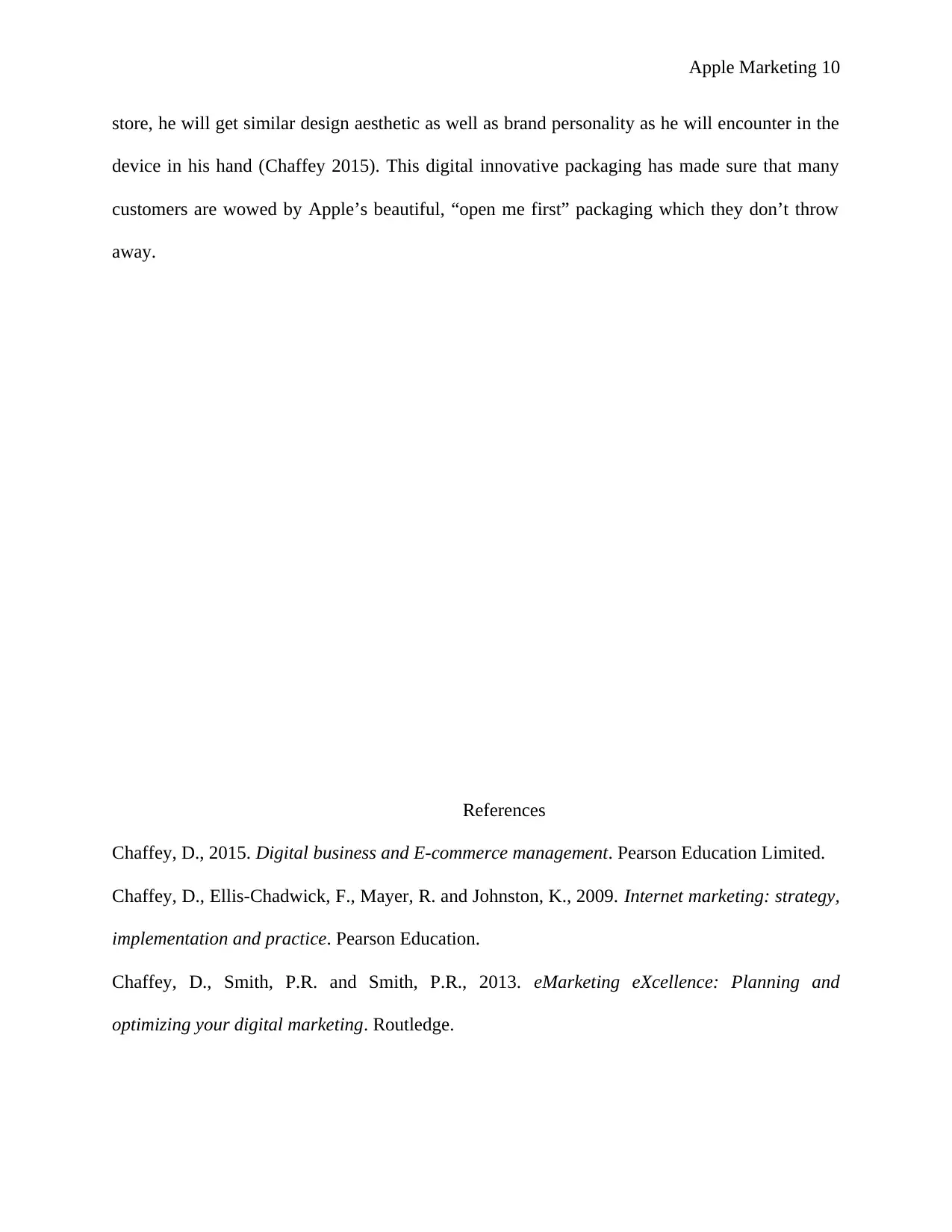
Apple Marketing 10
store, he will get similar design aesthetic as well as brand personality as he will encounter in the
device in his hand (Chaffey 2015). This digital innovative packaging has made sure that many
customers are wowed by Apple’s beautiful, “open me first” packaging which they don’t throw
away.
References
Chaffey, D., 2015. Digital business and E-commerce management. Pearson Education Limited.
Chaffey, D., Ellis-Chadwick, F., Mayer, R. and Johnston, K., 2009. Internet marketing: strategy,
implementation and practice. Pearson Education.
Chaffey, D., Smith, P.R. and Smith, P.R., 2013. eMarketing eXcellence: Planning and
optimizing your digital marketing. Routledge.
store, he will get similar design aesthetic as well as brand personality as he will encounter in the
device in his hand (Chaffey 2015). This digital innovative packaging has made sure that many
customers are wowed by Apple’s beautiful, “open me first” packaging which they don’t throw
away.
References
Chaffey, D., 2015. Digital business and E-commerce management. Pearson Education Limited.
Chaffey, D., Ellis-Chadwick, F., Mayer, R. and Johnston, K., 2009. Internet marketing: strategy,
implementation and practice. Pearson Education.
Chaffey, D., Smith, P.R. and Smith, P.R., 2013. eMarketing eXcellence: Planning and
optimizing your digital marketing. Routledge.
Paraphrase This Document
Need a fresh take? Get an instant paraphrase of this document with our AI Paraphraser
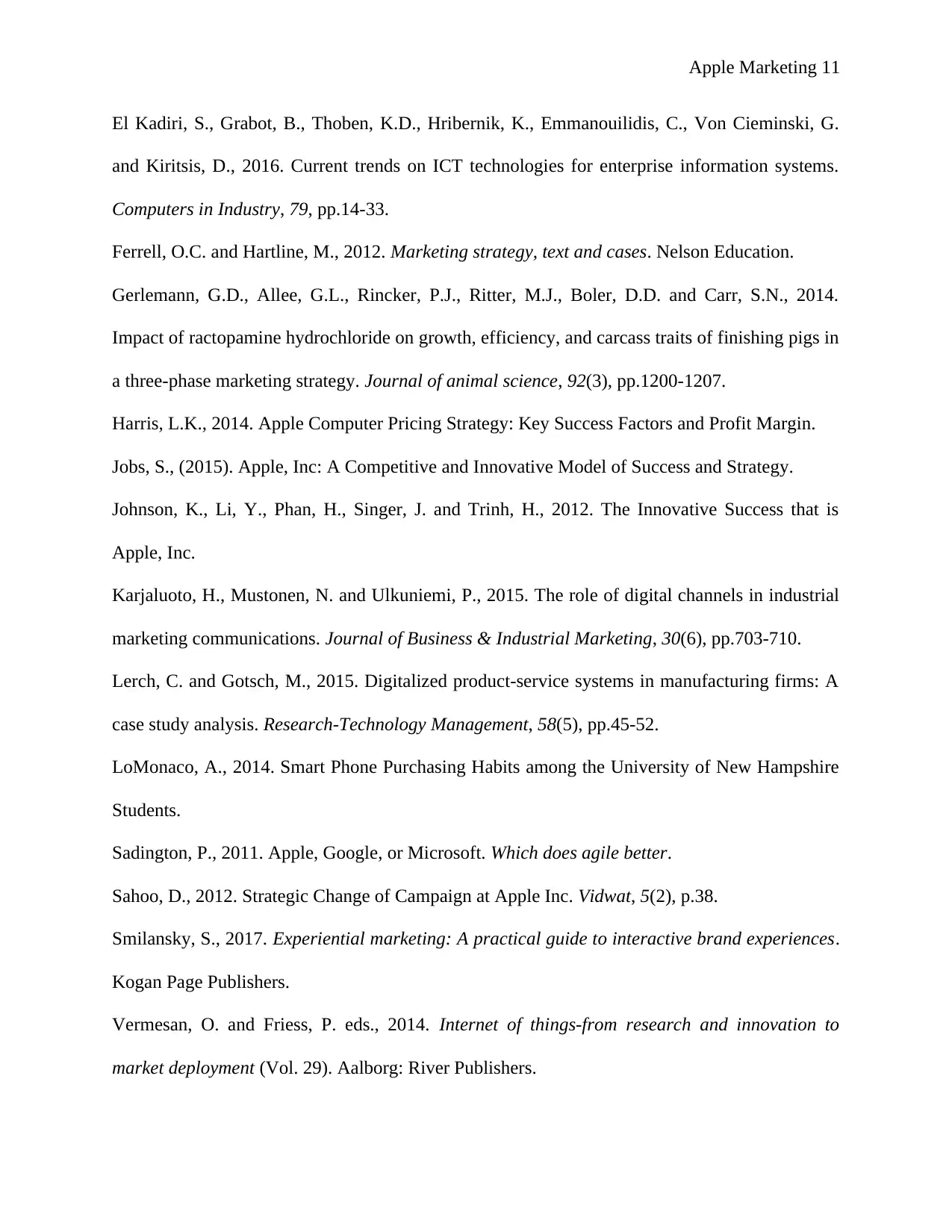
Apple Marketing 11
El Kadiri, S., Grabot, B., Thoben, K.D., Hribernik, K., Emmanouilidis, C., Von Cieminski, G.
and Kiritsis, D., 2016. Current trends on ICT technologies for enterprise information systems.
Computers in Industry, 79, pp.14-33.
Ferrell, O.C. and Hartline, M., 2012. Marketing strategy, text and cases. Nelson Education.
Gerlemann, G.D., Allee, G.L., Rincker, P.J., Ritter, M.J., Boler, D.D. and Carr, S.N., 2014.
Impact of ractopamine hydrochloride on growth, efficiency, and carcass traits of finishing pigs in
a three-phase marketing strategy. Journal of animal science, 92(3), pp.1200-1207.
Harris, L.K., 2014. Apple Computer Pricing Strategy: Key Success Factors and Profit Margin.
Jobs, S., (2015). Apple, Inc: A Competitive and Innovative Model of Success and Strategy.
Johnson, K., Li, Y., Phan, H., Singer, J. and Trinh, H., 2012. The Innovative Success that is
Apple, Inc.
Karjaluoto, H., Mustonen, N. and Ulkuniemi, P., 2015. The role of digital channels in industrial
marketing communications. Journal of Business & Industrial Marketing, 30(6), pp.703-710.
Lerch, C. and Gotsch, M., 2015. Digitalized product-service systems in manufacturing firms: A
case study analysis. Research-Technology Management, 58(5), pp.45-52.
LoMonaco, A., 2014. Smart Phone Purchasing Habits among the University of New Hampshire
Students.
Sadington, P., 2011. Apple, Google, or Microsoft. Which does agile better.
Sahoo, D., 2012. Strategic Change of Campaign at Apple Inc. Vidwat, 5(2), p.38.
Smilansky, S., 2017. Experiential marketing: A practical guide to interactive brand experiences.
Kogan Page Publishers.
Vermesan, O. and Friess, P. eds., 2014. Internet of things-from research and innovation to
market deployment (Vol. 29). Aalborg: River Publishers.
El Kadiri, S., Grabot, B., Thoben, K.D., Hribernik, K., Emmanouilidis, C., Von Cieminski, G.
and Kiritsis, D., 2016. Current trends on ICT technologies for enterprise information systems.
Computers in Industry, 79, pp.14-33.
Ferrell, O.C. and Hartline, M., 2012. Marketing strategy, text and cases. Nelson Education.
Gerlemann, G.D., Allee, G.L., Rincker, P.J., Ritter, M.J., Boler, D.D. and Carr, S.N., 2014.
Impact of ractopamine hydrochloride on growth, efficiency, and carcass traits of finishing pigs in
a three-phase marketing strategy. Journal of animal science, 92(3), pp.1200-1207.
Harris, L.K., 2014. Apple Computer Pricing Strategy: Key Success Factors and Profit Margin.
Jobs, S., (2015). Apple, Inc: A Competitive and Innovative Model of Success and Strategy.
Johnson, K., Li, Y., Phan, H., Singer, J. and Trinh, H., 2012. The Innovative Success that is
Apple, Inc.
Karjaluoto, H., Mustonen, N. and Ulkuniemi, P., 2015. The role of digital channels in industrial
marketing communications. Journal of Business & Industrial Marketing, 30(6), pp.703-710.
Lerch, C. and Gotsch, M., 2015. Digitalized product-service systems in manufacturing firms: A
case study analysis. Research-Technology Management, 58(5), pp.45-52.
LoMonaco, A., 2014. Smart Phone Purchasing Habits among the University of New Hampshire
Students.
Sadington, P., 2011. Apple, Google, or Microsoft. Which does agile better.
Sahoo, D., 2012. Strategic Change of Campaign at Apple Inc. Vidwat, 5(2), p.38.
Smilansky, S., 2017. Experiential marketing: A practical guide to interactive brand experiences.
Kogan Page Publishers.
Vermesan, O. and Friess, P. eds., 2014. Internet of things-from research and innovation to
market deployment (Vol. 29). Aalborg: River Publishers.

Apple Marketing 12
⊘ This is a preview!⊘
Do you want full access?
Subscribe today to unlock all pages.

Trusted by 1+ million students worldwide
1 out of 12
Related Documents
Your All-in-One AI-Powered Toolkit for Academic Success.
+13062052269
info@desklib.com
Available 24*7 on WhatsApp / Email
![[object Object]](/_next/static/media/star-bottom.7253800d.svg)
Unlock your academic potential
Copyright © 2020–2026 A2Z Services. All Rights Reserved. Developed and managed by ZUCOL.





